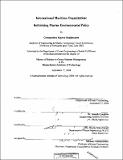International maritime organization : rethinking marine environmental policy
Author(s)
Hadjistassou, Constantinos Kyprou
DownloadFull printable version (4.454Mb)
Other Contributors
Massachusetts Institute of Technology. Dept. of Ocean Engineering.
Advisor
Joseph Coughlin and Hauke Kite-Powell.
Terms of use
Metadata
Show full item recordAbstract
As environmentalism has swept into political prominence, influencing the environmental policy of developed nations, the IMO- the UN dedicated legislator of the shipping industry- has been increasingly faced with challenges to its decision making process as well as to the effective fulfillment of its role. The current treatment of environmental matters, especially when it comes to negotiations for enacting universally accepted and implemented regulations seems to be in need for reconsideration. This is mainly the case because, the systematic adoption of unilateral/regional measures, at best, can undermine the status of the IMO and, at worst, may prove disruptive to international shipping. The purpose of this thesis is to put concerns over the role of the IMO in international environmental regulations negotiations into a specific context and attempt to view the organization's treatment of the issues it is faced with from a perspective which will reveal the strengths and the shortcomings of the IMO, so that credible remedies could be suggested. In order to achieve this goal, three case studies were used namely the Member States, the Interest Group, and the Industry case study. (cont.) These cases- selected to identify areas of improvement for the 1MO- have demonstrated that the agency's working procedures merit reassessment if the agency is to remain the industry's legislator. A close examination of the conclusions extracted from the three case studies reveals that the MO is faced with the challenge of leveraging multiple types of initiatives which can emanate from powerful maritime nations, coalition/regional groups, interest groups, stakeholders, and the public.Consequently, if it is to serve its purpose effectively and efficiently, the IMO ought to develop the institutional mechanisms that will encourage policy innovations in the realm of international environmental negotiations whilst strengthening the agency's status as the industry's legislator. Similarly, in view of its evolving role, the agency has to act proactively so as to strike a balance between environmentally sound and sustainable shipping. The closing chapter of the thesis indicates that judging the present and the future of the [MO should be done in the light of excessive pessimism, since some initiatives already underway may improve the current situation, but there is still a lot of room for improvement.
Description
Thesis (S.M.)--Massachusetts Institute of Technology, Dept. of Ocean Engineering, 2005. Includes bibliographical references (leaves 67-70).
Date issued
2005Department
Massachusetts Institute of Technology. Department of Ocean EngineeringPublisher
Massachusetts Institute of Technology
Keywords
Ocean Engineering.